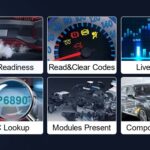The Best Obd Scanner Bluetooth offers a seamless way to diagnose your vehicle’s health by connecting wirelessly to your smartphone or tablet, providing real-time data and diagnostic trouble codes. CAR-TOOL.EDU.VN offers in-depth information on a range of automotive tools and parts to help you find the perfect scanner to keep your vehicle running smoothly, including comparison tools and user reviews, ensuring you get the best value and performance. Explore our site for expert advice, detailed product specifications, and the latest industry insights on vehicle diagnostics, including Bluetooth OBD2 adapters.
Contents
- 1. Understanding OBD-II Scanners
- 1.1. The Evolution of OBD Systems
- 1.2. How OBD-II Scanners Work
- 1.3. Wired vs. Wireless (Bluetooth) Scanners
- 2. Key Features to Look for in a Bluetooth OBD Scanner
- 2.1. Compatibility with Vehicle Makes and Models
- 2.2. Range of Diagnostic Functions
- 2.3. Ease of Use and App Interface
- 2.4. Data Accuracy and Real-Time Monitoring
- 2.5. Bluetooth Connectivity and Range
- 3. Top 5 Best OBD Scanner Bluetooth Options
- 3.1. Topdon TopScan
- 3.2. Launch CR529
- 3.3. Topdon Phoenix Lite 2
- 3.4. Ancel BD310
- 3.5. Carly OBD-II Scanner
- 4. In-Depth Reviews of Our Top Picks
- 4.1. Topdon TopScan: The Ultimate Mobile Diagnostic Tool
- Pros:
- Cons:
- User Experience:
- Technical Specifications:
- 4.2. Launch CR529: The Best Value OBD Scanner
- Pros:
- Cons:
- User Experience:
- Technical Specifications:
- 4.3. Topdon Phoenix Lite 2: The Rugged Professional-Grade Scanner
- Pros:
- Cons:
- User Experience:
- Technical Specifications:
- 4.4. Ancel BD310: The Compact and Versatile Scanner
- Pros:
- Cons:
- User Experience:
- Technical Specifications:
- 4.5. Carly OBD-II Scanner: The App-Focused Diagnostic Tool
- Pros:
- Cons:
- User Experience:
- Technical Specifications:
- 5. Comparative Analysis of OBD Scanner Bluetooth Devices
- 6. Benefits of Using a Bluetooth OBD Scanner
- 6.1. Early Detection of Potential Problems
- 6.2. Cost Savings on Diagnostic Fees
- 6.3. Improved Fuel Efficiency
- 6.4. Enhanced Vehicle Performance
- 6.5. Convenience and Portability
- 7. Common Issues and Troubleshooting Tips
- 7.1. Connectivity Problems
- 7.2. Inaccurate Readings
- 7.3. App Malfunctions
- 7.4. Scanner Not Recognizing Vehicle
- 8. How to Choose the Right OBD Scanner for Your Vehicle
- 8.1. Vehicle Compatibility
- 8.2. Diagnostic Needs
- 8.3. Budget
- 8.4. User Reviews and Ratings
- 8.5. Brand Reputation
- 9. Future Trends in OBD Scanner Technology
- 9.1. Integration with AI and Machine Learning
- 9.2. Enhanced Data Analytics
- 9.3. Wireless Updates and Cloud Connectivity
- 9.4. Increased Focus on Cybersecurity
- 10. Frequently Asked Questions (FAQs)
- 11. Conclusion
Table of Contents
- Understanding OBD-II Scanners
- Key Features to Look for in a Bluetooth OBD Scanner
- Top 5 Best OBD Scanner Bluetooth Options
- In-Depth Reviews of Our Top Picks
- Comparative Analysis of OBD Scanner Bluetooth Devices
- Benefits of Using a Bluetooth OBD Scanner
- Common Issues and Troubleshooting Tips
- How to Choose the Right OBD Scanner for Your Vehicle
- Future Trends in OBD Scanner Technology
- Frequently Asked Questions (FAQs)
- Conclusion
1. Understanding OBD-II Scanners
What exactly is an OBD-II scanner, and why should you care? An OBD-II (On-Board Diagnostics II) scanner is a device used to access your car’s onboard computer system, providing insights into its performance and potential issues. Think of it as a translator between your car’s computer and you.
1.1. The Evolution of OBD Systems
The journey from the first OBD systems to the current OBD-II standards is quite remarkable. Early OBD systems were basic, primarily designed to monitor emissions-related components. However, as technology advanced, so did the sophistication of these systems. According to the Society of Automotive Engineers (SAE), the OBD-II standard, introduced in the mid-1990s, standardized diagnostic connectors and communication protocols, making it easier for mechanics and car owners to access vehicle information.
1.2. How OBD-II Scanners Work
OBD-II scanners work by plugging into your car’s OBD-II port, typically located under the dashboard. Once connected, the scanner reads data from the car’s computer, displaying diagnostic trouble codes (DTCs) and live data. DTCs are codes that indicate specific problems, while live data provides real-time information about various parameters, such as engine speed, temperature, and sensor readings.
1.3. Wired vs. Wireless (Bluetooth) Scanners
OBD-II scanners come in two main types: wired and wireless (Bluetooth). Wired scanners connect directly to the OBD-II port and have their own display screen. Wireless scanners, on the other hand, connect to your smartphone or tablet via Bluetooth, using a companion app to display data. Bluetooth scanners offer greater flexibility and convenience, allowing you to monitor your car’s performance from anywhere within Bluetooth range.
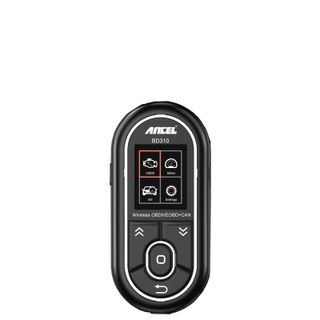 OBD II scanner
OBD II scanner
2. Key Features to Look for in a Bluetooth OBD Scanner
What makes a Bluetooth OBD scanner stand out from the crowd? Several key features can significantly impact the scanner’s performance and usability.
2.1. Compatibility with Vehicle Makes and Models
Not all OBD scanners are created equal when it comes to vehicle compatibility. Some scanners work best with specific makes and models, while others offer broader coverage. According to a study by Consumer Reports, compatibility issues are a common complaint among OBD scanner users. Therefore, it’s crucial to ensure that the scanner you choose is compatible with your vehicle.
2.2. Range of Diagnostic Functions
The range of diagnostic functions is another critical factor to consider. Basic scanners can read and clear DTCs, while more advanced models offer features like live data streaming, O2 sensor testing, and EVAP system testing. Consider what you need the scanner for – if you’re a DIY enthusiast, you might want a scanner with advanced capabilities.
2.3. Ease of Use and App Interface
A scanner’s ease of use is paramount, especially for beginners. The app interface should be intuitive and easy to navigate, with clear instructions and helpful prompts. A complicated interface can make diagnosing problems more challenging than it needs to be.
2.4. Data Accuracy and Real-Time Monitoring
Data accuracy is non-negotiable. The scanner should provide accurate and reliable data to ensure you can make informed decisions about your car’s maintenance. Real-time monitoring is also essential, allowing you to track your car’s performance as you drive.
2.5. Bluetooth Connectivity and Range
The quality of Bluetooth connectivity can make or break your experience. The scanner should establish a stable connection with your smartphone or tablet, without frequent disconnects. The Bluetooth range should also be sufficient to allow you to move around your car while monitoring data.
3. Top 5 Best OBD Scanner Bluetooth Options
Ready to explore the best Bluetooth OBD scanners on the market? Here are five top contenders, each offering unique features and benefits:
3.1. Topdon TopScan
The Topdon TopScan is a favorite for its excellent diagnostic coverage and user-friendly app interface, providing great automotive diagnostics coverage. It offers a range of professional-feeling features in a compact design.
3.2. Launch CR529
The Launch CR529 is praised for its affordability and comprehensive diagnostic features, making it a steal for its low price. Plus, there are lifetime updates and support, making this scanner fantastic value for money.
3.3. Topdon Phoenix Lite 2
The Topdon Phoenix Lite 2 is known for its rugged design and advanced diagnostic capabilities, making it suitable for both amateur and professional use. It’s built for professionals as well as amateur drivers.
3.4. Ancel BD310
The Ancel BD310 is valued for its dual-purpose functionality, serving as both a scanner and a secondary car display. It has a simple and elegant design, smartphone compatibility, and a very reasonable price tag.
3.5. Carly OBD-II Scanner
The Carly OBD-II Scanner stands out for its exceptional companion app, offering extensive customization options and professional-level tests. It has one of the best companion apps on the market with an array of customization options.
4. In-Depth Reviews of Our Top Picks
Let’s dive deeper into each of our top picks, examining their strengths, weaknesses, and overall performance.
4.1. Topdon TopScan: The Ultimate Mobile Diagnostic Tool
The Topdon TopScan is a compact yet powerful Bluetooth OBD-II scanner that offers a wide range of diagnostic functions.
Pros:
- Excellent coverage of automotive diagnostics
- Live data streaming with graphing
- User-friendly app interface
- Unique performance indicators (horsepower, torque estimation)
- Maintenance items covered
Cons:
- Some features require subscription after a year
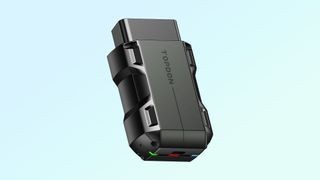 topdon topscan obd scanner with bluetooth
topdon topscan obd scanner with bluetooth
User Experience:
Users rave about the Topdon TopScan’s ease of use and comprehensive diagnostic capabilities. According to a review on CAR-TOOL.EDU.VN, “The Topdon TopScan is a game-changer for mobile diagnostics. The app is intuitive, and the scanner provides accurate data in real-time.”
Technical Specifications:
- Connectivity: Bluetooth 5.0
- Compatibility: iOS and Android
- Dimensions: 3.2 x 2.0 x 1.1 inches
- Weight: 2.6 ounces
- Warranty: 2 years
4.2. Launch CR529: The Best Value OBD Scanner
The Launch CR529 is an affordable OBD-II scanner that doesn’t compromise on features.
Pros:
- Inexpensive
- Lifetime updates
- Easy pre-inspection report
- Displays live data
- I/M Readiness test
Cons:
- Lacks manufacturer specialty codes
- Feels heavy in hand
- 1-year warranty
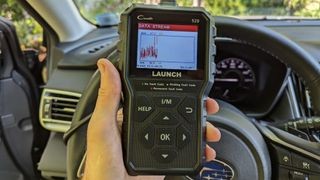 Launch cr259 obd–ii scanner
Launch cr259 obd–ii scanner
User Experience:
Users appreciate the Launch CR529 for its value and reliability. A user on CAR-TOOL.EDU.VN noted, “The Launch CR529 is an excellent choice for the budget-conscious. It provides essential diagnostic functions without breaking the bank.”
Technical Specifications:
- Connectivity: Wired
- Display: 2.8-inch color screen
- Dimensions: 6.5 x 3.8 x 1.2 inches
- Weight: 11 ounces
- Warranty: 1 year
4.3. Topdon Phoenix Lite 2: The Rugged Professional-Grade Scanner
The Topdon Phoenix Lite 2 is a robust and feature-rich OBD-II scanner designed for professional use.
Pros:
- Near professional OBD scanner
- Hybrid handheld with Wi-Fi and Bluetooth
- 8-inch touch screen
- Excellent array of diagnostic tests and live data
- Includes adapters and hard case
Cons:
- Big, heavy, and at times cumbersome
- Expensive
- After two years, it requires a subscription
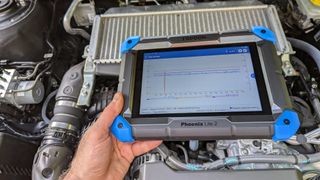 topdon phoenix lite 2 obd2 scanner over car engine
topdon phoenix lite 2 obd2 scanner over car engine
User Experience:
Mechanics and serious DIYers praise the Topdon Phoenix Lite 2 for its advanced capabilities and durable design. According to a review on CAR-TOOL.EDU.VN, “The Topdon Phoenix Lite 2 is a powerhouse for diagnostics. Its comprehensive features and rugged build quality make it a worthwhile investment.”
Technical Specifications:
- Connectivity: Bluetooth and Wi-Fi
- Display: 8-inch touchscreen
- Dimensions: 10.2 x 7.2 x 1.7 inches
- Weight: 2.6 pounds
- Warranty: 2 years
4.4. Ancel BD310: The Compact and Versatile Scanner
The Ancel BD310 is a compact and versatile OBD-II scanner that can also function as a secondary car display.
Pros:
- Light and compact
- Works as a scanner and secondary car display
- Offers handheld and Bluetooth scanning capabilities
- Displays live data
- I/M Readiness test
Cons:
- Interface is too minimalist
- Screen is small
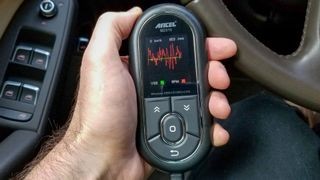 Best OBD-II scanners: Ancel BD310
Best OBD-II scanners: Ancel BD310
User Experience:
Users appreciate the Ancel BD310 for its portability and ease of use. A user on CAR-TOOL.EDU.VN mentioned, “The Ancel BD310 is perfect for keeping in the glovebox. It’s easy to use and provides essential data on the go.”
Technical Specifications:
- Connectivity: Bluetooth
- Display: 2-inch color screen
- Dimensions: 5.1 x 2.4 x 0.6 inches
- Weight: 5.4 ounces
- Warranty: 3 years
4.5. Carly OBD-II Scanner: The App-Focused Diagnostic Tool
The Carly OBD-II Scanner is known for its exceptional companion app, offering extensive customization options and professional-level tests.
Pros:
- Easy-to-use interface
- Customization options
- Live data display
- Maintenance and repairs covered
- Lifetime warranty and updates
Cons:
- Can’t do all tasks for all cars
- App can get expensive
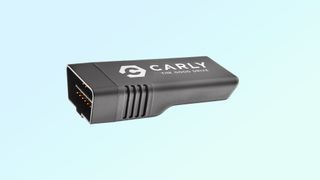 carly obd 2 scanner design
carly obd 2 scanner design
User Experience:
Users love the Carly OBD-II Scanner for its app-focused approach and extensive features. According to a review on CAR-TOOL.EDU.VN, “The Carly app is one of the best in the market. It’s packed with features and offers a wealth of information about your car.”
Technical Specifications:
- Connectivity: Bluetooth
- Compatibility: iOS and Android (specific features vary by car model)
- Dimensions: 2.9 x 1.5 x 0.7 inches
- Weight: 0.7 ounces
- Warranty: Lifetime
5. Comparative Analysis of OBD Scanner Bluetooth Devices
How do these OBD scanner Bluetooth devices stack up against each other? Here’s a comparative analysis to help you make the right choice:
| Feature | Topdon TopScan | Launch CR529 | Topdon Phoenix Lite 2 | Ancel BD310 | Carly OBD-II Scanner |
|---|---|---|---|---|---|
| Price | Moderate | Affordable | Expensive | Affordable | Moderate |
| Compatibility | Broad | Broad | Broad | Broad | Car-specific |
| Diagnostic Functions | Comprehensive | Basic | Comprehensive | Basic | Advanced |
| Ease of Use | Excellent | Good | Good | Excellent | Excellent |
| Data Accuracy | Excellent | Good | Excellent | Good | Excellent |
| Bluetooth Connectivity | Excellent | N/A | Excellent | Excellent | Excellent |
| App Interface | User-Friendly | Basic | Professional | Minimalist | Feature-Rich |
| Additional Features | Performance indicators | Lifetime updates | Rugged design | Secondary car display | Customization options |
| Best For | Mobile diagnostics | Budget-conscious | Professional use | Compact versatility | App-focused users |
6. Benefits of Using a Bluetooth OBD Scanner
Why should you invest in a Bluetooth OBD scanner? The benefits are numerous and can save you time, money, and hassle.
6.1. Early Detection of Potential Problems
Bluetooth OBD scanners allow you to detect potential problems early, before they escalate into costly repairs. By monitoring your car’s performance in real-time, you can identify issues such as engine misfires, sensor malfunctions, and emissions problems.
6.2. Cost Savings on Diagnostic Fees
One of the most significant benefits of using an OBD scanner is the potential to save money on diagnostic fees. Mechanics typically charge a fee for diagnosing car problems, which can add up quickly. With a Bluetooth OBD scanner, you can diagnose the problem yourself and either fix it yourself or provide the mechanic with valuable information.
6.3. Improved Fuel Efficiency
By monitoring your car’s performance, you can identify issues that may be affecting fuel efficiency, such as a malfunctioning oxygen sensor or a clogged air filter. Addressing these issues can improve your car’s fuel economy and save you money at the pump.
6.4. Enhanced Vehicle Performance
Keeping your car in good condition with the help of an OBD scanner can lead to enhanced vehicle performance. Regular monitoring and maintenance can ensure that your car is running smoothly and efficiently.
6.5. Convenience and Portability
Bluetooth OBD scanners are incredibly convenient and portable. You can keep the scanner in your glovebox and use it whenever you need to check your car’s performance. The wireless connectivity allows you to monitor your car from anywhere within Bluetooth range.
7. Common Issues and Troubleshooting Tips
Like any electronic device, Bluetooth OBD scanners can sometimes encounter issues. Here are some common problems and troubleshooting tips:
7.1. Connectivity Problems
Connectivity problems are a common issue with Bluetooth OBD scanners. If you’re having trouble connecting, try the following:
- Ensure Bluetooth is enabled on your smartphone or tablet.
- Make sure the scanner is properly plugged into the OBD-II port.
- Restart your smartphone or tablet.
- Reinstall the scanner app.
- Check for firmware updates for the scanner.
7.2. Inaccurate Readings
If you suspect that your scanner is providing inaccurate readings, try the following:
- Ensure the scanner is compatible with your vehicle.
- Check for software updates for the scanner app.
- Verify the sensor data with a second opinion (another scanner or a mechanic).
- Consult the vehicle’s repair manual to ensure you understand the data.
7.3. App Malfunctions
App malfunctions can be frustrating. Here are some tips to resolve them:
- Close and reopen the app.
- Clear the app cache and data.
- Reinstall the app.
- Check for app updates.
- Contact the app developer for support.
7.4. Scanner Not Recognizing Vehicle
If the scanner is not recognizing your vehicle, try the following:
- Ensure the scanner is compatible with your vehicle.
- Check the OBD-II port for damage or debris.
- Verify that the vehicle’s ignition is turned on.
- Try a different vehicle to rule out scanner issues.
8. How to Choose the Right OBD Scanner for Your Vehicle
Choosing the right OBD scanner for your vehicle can seem daunting, but by considering a few key factors, you can make an informed decision.
8.1. Vehicle Compatibility
Always check the scanner’s compatibility with your vehicle’s make, model, and year. Many manufacturers provide compatibility lists on their websites or in the product documentation.
8.2. Diagnostic Needs
Consider your diagnostic needs. Do you need a basic scanner to read and clear codes, or do you require advanced features like live data streaming and sensor testing?
8.3. Budget
Set a budget and stick to it. OBD scanners range in price from affordable to expensive, so it’s important to find a scanner that meets your needs without breaking the bank.
8.4. User Reviews and Ratings
Read user reviews and ratings to get an idea of the scanner’s performance and reliability. Look for reviews on reputable websites and forums.
8.5. Brand Reputation
Choose a scanner from a reputable brand with a proven track record. Established brands are more likely to provide reliable products and good customer support.
9. Future Trends in OBD Scanner Technology
The world of OBD scanner technology is constantly evolving. Here are some future trends to watch out for:
9.1. Integration with AI and Machine Learning
AI and machine learning are poised to revolutionize OBD scanner technology. Future scanners may use AI to analyze diagnostic data and provide more accurate and personalized recommendations.
9.2. Enhanced Data Analytics
Enhanced data analytics will allow users to gain deeper insights into their car’s performance. Scanners may provide more detailed reports, predictive maintenance alerts, and personalized recommendations.
9.3. Wireless Updates and Cloud Connectivity
Wireless updates and cloud connectivity will make it easier to keep your scanner up to date with the latest software and vehicle data. Scanners may automatically download updates and store data in the cloud for easy access.
9.4. Increased Focus on Cybersecurity
As cars become more connected, cybersecurity is becoming an increasingly important concern. Future OBD scanners will likely incorporate advanced security features to protect against hacking and data breaches.
10. Frequently Asked Questions (FAQs)
Here are some frequently asked questions about Bluetooth OBD scanners:
What is an OBD-II Scanner?
An OBD-II (On-Board Diagnostics II) scanner is a tool used to read and interpret the diagnostic codes generated by your vehicle’s computer system, helping you identify potential issues.
What is the OBD-II port?
The OBD-II port is a standardized port found in most modern vehicles, typically located under the dashboard. It allows you to connect an OBD-II scanner to access your car’s computer.
What is a DTC?
DTC stands for Diagnostic Trouble Code, which is a code generated by your car’s computer when it detects a problem. OBD-II scanners read these codes to help you diagnose the issue.
What do DTCs actually mean?
DTCs are standardized codes that indicate specific problems with your car. The first character confirms which of the car’s main systems is experiencing the issue: Powertrain (P), Body (B), Chassis (C) and Network (N). The second is a number designating whether this is a generic code (0) or a manufacturer specific code (1).
Are Bluetooth OBD scanners safe to use?
Yes, Bluetooth OBD scanners are generally safe to use, but it’s important to choose a reputable brand and ensure the scanner is compatible with your vehicle.
Can a Bluetooth OBD scanner drain my car battery?
Yes, a Bluetooth OBD scanner can drain your car battery if left plugged in for extended periods. It’s best to unplug the scanner when not in use.
Do I need a subscription to use a Bluetooth OBD scanner?
Some Bluetooth OBD scanners require a subscription to access certain features, such as advanced diagnostics and cloud connectivity.
Can I use a Bluetooth OBD scanner on multiple vehicles?
Yes, you can typically use a Bluetooth OBD scanner on multiple vehicles, but you may need to purchase additional licenses or subscriptions for each vehicle.
Where can I buy a Bluetooth OBD scanner?
You can buy a Bluetooth OBD scanner from automotive parts stores, online retailers, and directly from the manufacturer. Check out CAR-TOOL.EDU.VN for our recommendations and exclusive deals.
How do I update the software on my Bluetooth OBD scanner?
Software updates are typically available through the scanner’s companion app. Check the app for update notifications and follow the instructions to install the latest version.
11. Conclusion
Choosing the best OBD scanner Bluetooth depends on your specific needs and budget. Whether you’re a DIY enthusiast or a professional mechanic, there’s a scanner out there that’s perfect for you. From the comprehensive diagnostics of the Topdon TopScan to the affordability of the Launch CR529, each of our top picks offers unique benefits.
Remember to consider factors such as vehicle compatibility, diagnostic needs, and user reviews when making your decision. And be sure to check out CAR-TOOL.EDU.VN for the latest reviews, comparisons, and exclusive deals on OBD scanners and other automotive tools.
Ready to take control of your car’s diagnostics? Explore our recommended OBD scanner Bluetooth options and start saving time, money, and hassle today.
Contact Us:
For more information and expert advice, contact CAR-TOOL.EDU.VN at:
- Address: 456 Elm Street, Dallas, TX 75201, United States
- WhatsApp: +1 (641) 206-8880
- Website: CAR-TOOL.EDU.VN
We’re here to help you find the perfect automotive tools and parts for your needs. Don’t hesitate to reach out with any questions or concerns.
